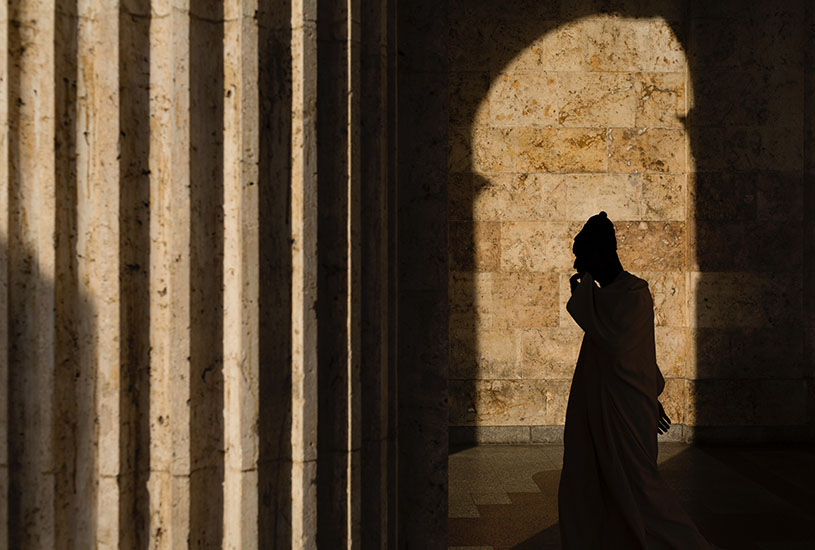A major international research project has shown that, for most Muslims, religious values enhance their sense of citizenship and ability to be just, open and caring people.
International research led by the Alfred Deakin Institute for Citizenship and Globalisation (ADI) has challenged public debate and policy relating to Muslims’ practice of their faith.
It reveals that the picture created in public media is at odds with most Muslim’s everyday experiences and understandings of Islam.
The findings are contained in the Australian Research Council (ARC) Discovery-funded project, “Islamic Religiosity in the West: Belonging and Political Engagement in Multicultural Societies.”
A report on the research was launched by Deakin University Vice-Chancellor Professor Jane den Hollander AO, at the University’s Iftar dinner (during Ramadan).
With a team of international colleagues, the researchers examined Muslims living in Australia, France and the United States, analysing their spiritual connection and practice of Islam, and how these influence their sense of belonging and political engagement.
Professor den Hollander highlighted the report’s emphasis on the practice and beliefs of Islam, the making of local social connections and neighbourliness.
She told guests the story behind the formation of her own friendship with two former international students at the dinner who were both doing their PhDs when she met them. Both are now scientists in full-time work, but embedded in their community teaching new international students to swim and surf.
[testimonial_text]What great examples of contribution we have in confusing and ambiguous times. We live in a community where what matters is not the difference between us, but the things that join us together.[/testimonial_text]
[testimonial_picture name=”Professor Jane den Hollander AO” details=”Deakin University Vice Chancellor”]
 [/testimonial_picture]
[/testimonial_picture]Project chief investigator, ADI Director Professor Fethi Mansouri, said it was fitting the report was launched during the holy month of Ramadan – a significant event for all respondents in the research.
“The findings and the comments from Muslims, particularly young Muslims, reinforce the need to challenge and change the public discussion on Islamic religiosity to one that is informed and accurate,” he said.
[testimonial_text]Policy attitudes relating to Islam also need to change. The findings of this research project will, hopefully, help achieve this.[/testimonial_text]
[testimonial_picture name=”Professor Fethi Mansouri” details=”ADI Director”]
 [/testimonial_picture]
[/testimonial_picture]Professor Mansouri said that current public discussion often portrays Islamic religiosity as potentially a security problem at odds with Western norms of democracy, secularism, liberty and individual rights.
“More problematically, Muslim’s loyalty to the nation-state is often questioned, particularly in the context of more salient security threats,” he said.
“Yet, as this research shows, Muslims in the West are diverse, have a rich and nuanced engagement with their faith and do not see this as being at odds with the democratic values of the country in which they live.
“Indeed, they feel that their religious values enhance their ability to be good citizens and be just, open and caring people.”
Professor Mansouri said the report examined the question of whether Muslims in the West have the individual capacity and social support to be fully active citizens, whilst upholding their religious values and practices.
The report looks at four areas: Self Identity and Islamic Rituals; Religious Practices; Public Space and Social Connectedness; and Citizenship, Belonging and Political Engagement in a changing geopolitical context.
The three major sites in the report – Melbourne, Grenoble/Lyon and Detroit – had been selected because each had a Muslim population that was ethnically, culturally and religiously diverse.
“The Muslim populations living in these cities have also been the subject of public discourse and media reports highlighting tensions between their visibility as Muslims and their religious practice,” Professor Mansouri said.
He noted that France, the United States and Australia all had divergent approaches to religion and its accommodation in the public sphere.
“We wanted to see if these different policy approaches, coupled with the different demographics, affected Muslims’ political and social participation, and feelings of belonging,” he said.
The research found that Islamic practices indeed generated civic engagement in local communities, reinforced democratic citizenship ideals (both liberal and republican), and strengthened individual commitments to and engagement with diversity.
“The Islamic religious and spiritual traditions help individual Muslims deal with deeply-embedded problems of social inequality and systemic injustice,” he said.
He added that the sweeping negative portrayal of Muslim communities in the media and public discussion contributes to the experiences of racism and social exclusion.
“This exacerbates a sense of exclusion and marginalisation that can at times lead to youth disengagement from and cynicism towards public initiatives.”



